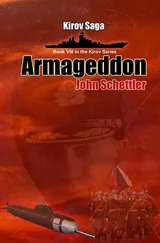He struggled up on one elbow, noting the lattice of coarse wood beams spaced at regular intervals between two metal rails. The place had a name in his mind now, and his sensibilities sharpened somewhat. His attention was soon focused on the sky, looking for the telltale drifts of cinder and smoky ash. Instead he saw streaks of gray-black clouds, which thinned in places to open on patches of starry sky.
This can’t be right, he said to himself again. It was morning before—a brooding red dawn with that strange sulfuric smell on the air. Now it was night again. Could he have passed out from the noxious fumes and then wandered all day in a half-daze until he found this place?
The singing of the metal rail line tugged at his attention and he struggled up onto unsteady feet, looking for some source of the sound. Off to his right he immediately saw the strange light again, closer now, and brighter. He knew at once that a train was coming, and some guarded corner of his mind whispered a warning to him. He began to move, stumbling over the rail lines and making his way along the tracks. Dizziness returned in waves, then receded. The sound of the train changed in tempo, and he heard a hissing release of pent up steam. He dimly perceived the sooty, black billow of smoke bloom from the bulk of a massive shape lit by a single eye of yellow light.
The churning sound slowed and the intervals that spaced its chugging rhythm grew ever longer. He heard the squeal of metal on metal and a last hiss of steam. The train was stopping. The voice in his mind began to clamor at him now, urging him to move, to get off the rail bed and hide. He tried to obey, nearly tripping over a large rock at the side of the rail line. As he struggled to keep his footing, the ground seemed to vanish beneath him and he fell, rolling down the side of a short, sandy embankment. His vision danced again, the dizziness returning as he groped the damp earth for some sense of perspective in the inky darkness. He was soon able to pull himself up onto his feet again, and began stumbling away in into the desert.
Voices came to him, faint and far away. He remembered Nordhausen, wondering what had become of his friend. The voices grew louder, more insistent, though he did not know what they were saying. Formless shapes seemed to materialize before him as his head lightened again and he swayed, faint and cold.
The next thing he remembered was the sound of another voice braying at him in an unfamiliar tongue. Hands were on him now, hard and cruel as they gripped his arms and shoulders, dragging him along. His feet struggled to move in a half-hearted, instinctive effort but, more often than not, his leather boots scuffed on the sand and gravel beneath him as he was pulled along. The hissing sound grew near and he was thrust hard against the flat, regular surface of something like a wall. His sensibilities were stirred by the jolt and he realized he had been pushed against the side of a train car, propped up by two rough looking men with dark beards and foul breath. Another man was peering at him, his fat lips moving as he spoke in an unintelligible voice.
The man reached out and took hold of his chin, squeezing his cheeks as he shook his head slightly. Then he seemed to come to some conclusion and strode away into the dark. A few moments later, Paul was dragged off again in the iron grip of his bearded captors. For the first time Paul realized these men must be soldiers. His mind was sluggish and late in sorting out the clues: they were dressed in uniform, and carried rifles slung over their backs above bandoliers of ammunition.
He knew what was happening to him now. This was the rail line in the Hejaz. Kelly had found a way to move them back on the target. This must be one of the trains manned by Turkish soldiers. But which train? What day was it? The warning voice in his mind began to nag at him again, and a flutter of anxiety stirred in his chest.
He felt himself being lifted, dragged up a short flight of steps, and pushed through a narrow door. It was a train coach that had been cleared of its normal seating and furnished with a few simple desks and chairs, probably an officer’s coach, he thought. The relative warmth of the room was a scant comfort to him, and his eyes adjusted to the light of a single oil lamp guttering on a flat wooden desk to one side of the coach. There was a man seated there, dark and stiff in bearing. The light gleamed on his sleek black hair and he stared at Paul with a contemptuous look. His lips seemed to smirk below the dark stain of a thin mustache. Paul could see that the man wore insignia of rank, possibly a Captain, or most likely a Colonel in charge of this troop train.
The man looked away for a moment turning his attention to a sheaf of paperwork on the desk. He dipped his ink pen into a shallow well and traced a few tentative strokes on a register with a dispassionate look on his face. As one hand pressed a stiff finger down the long list of names on his register, the other casually flicked off a checkmark here and there. The ink pen hovered over the paper briefly, and then he started to write. When no mark appeared on the paper he looked and saw that his pen was out of ink. He reached to dip it again in the ever diminishing pool of black ink, but then thought the better of it. With a sigh he put the pen down and turned his attention to the guards.
He spoke to the men in a hard edged voice. Though Paul could not understand anything that was said, it was clear that the Colonel was not pleased with this interruption. The man’s eyes shifted to Paul again, narrowing with curiosity. He pursed his lips, deciding something, and gestured at the overhead rail that ran along the edge of the roof to provide a hand hold while the train was moving.
There was no doubt in Paul’s mind now. He had stumbled onto the railway, and now he was taken by the Turks. Lord, help me, he thought. What day is it? Where exactly am I? Is this one of the trains Nordhausen had talked about? A thousand questions began to prey upon him now, and each one added to the queasy sense of alarm and fear in his chest.
Paul felt the guards tighten their grip on him, stretching his arms up overhead and binding his wrists to a cold metal rail near the roof. The leather ties were pulled tight and bit at his hands when the guards released him. Paul struggled to gain his footing, letting his legs take the weight of his body to ease the strain. He was able to stand, though his legs felt tired and weak.
The man at the desk waved at the guards again and they snapped off a crisp salute before tramping out through the narrow doorway, which closed in a creaking thump behind them. Paul’s eyes began to focus on the other man, noting his clean, well kept uniform and the polished leather of his belt and boots. But his vision was still a bit blurry; his thinking hazy in the unfamiliar setting.
The man spoke to him in a foreign tongue that he knew must be Turkish. He had no comprehension of what the officer was saying, but if his tone was any indication, the man was making some derisive remark, his eyes replete with accusation as he spoke. The officer stood up suddenly and stepped closer, staring at him with curious regard. He looked him up and down, then his hand began feeling at Paul’s robes, groping the loose folds of his soiled clothing. His disgust seemed to redouble, and he reached out, rudely snatching Paul’s headdress away and throwing it to the ground.
The officer shouted something at him, and when Paul did not answer he was struck a sharp blow on the side of his face. The slap from the officer’s open palm was just enough to shake Paul’s senses from the doldrums that had fogged them. His eyes rolled, then grew more focused. The officer slapped him again.
“Damn!” the invective slipped from Paul’s lips before he realized what he was saying. He wanted to remain mute, to endure the interrogation as though deaf and dumb, but he did not yet have the presence of mind to control himself. The officer’s eyes widened at the remark, and he seemed to immediately come to a new assessment of his captive.
Читать дальше












